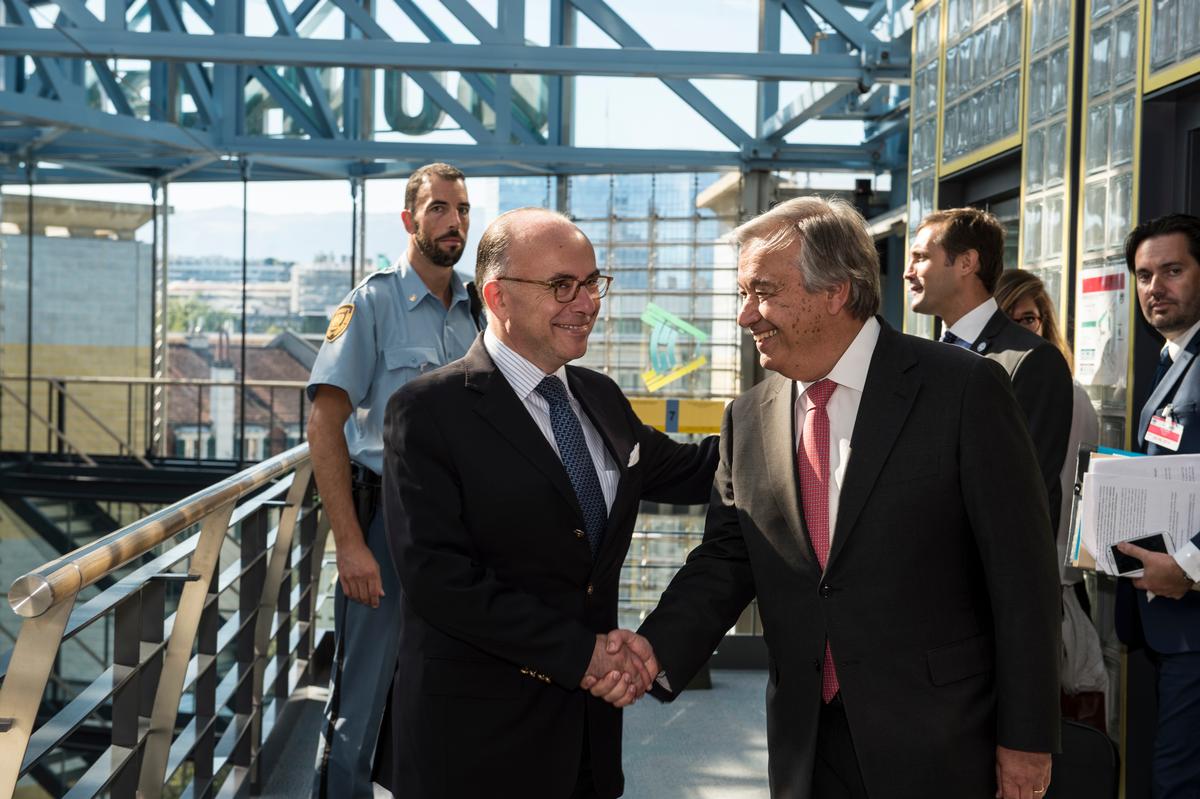UNHCR's Guterres says global humanitarian crises at levels unmatched in recent history
UNHCR's Guterres says global humanitarian crises at levels unmatched in recent history
GENEVA, Switzerland, 1 Oct 2012 (UNHCR) - The head of the UN refugee agency, António Guterres, warned today that UNHCR and other humanitarian actors are under increasing strain from a combination of simultaneous major new conflicts and unresolved old ones.
In a speech in Geneva to the opening of the annual meeting of UNHCR's Executive Committee, Guterres said UNHCR was facing a level of refugee crises unmatched in its recent history, with simultaneous new emergencies in Syria, Mali, Sudan and South Sudan, and Democratic Republic of Congo.
"Already in 2011, as crisis after crisis unfolded, more than 800,000 people crossed borders in search of refuge - an average of more than 2000 refugees every day. And this was higher than at any time in the last decade," he said. "And so far this year, more than 700,000 people have fled from the DRC, Mali, Sudan and Syria."
Guterres said UNHCR's capacity to help the world's forcibly displaced was being "radically tested" by this acceleration in new crises. He praised countries that have kept borders open to people fleeing conflict, and thanked donors for continuing to provide generous support particularly during a period of global economic strain. However, the High Commissioner also warned that the costs of helping the world's more than 42 million forcibly displaced were escalating fast, with protracted large-scale displacement situations continuing - for example in Afghanistan and Somalia.
"We are at a moment when the demands on us are rising while the means available to respond have remained at a similar level to last year. Our operations in Africa, in particular, are dramatically underfunded," he said. "At this moment, we have no room for any unforeseen needs. No reserves available. In today's unpredictable operating environment, this is a cause for deep concern."
Guterres said that to ameliorate matters UNHCR had instituted new efforts to improve efficiencies, among them cutting back on non-essential procurement and tightened control on replenishment of aid stockpiles. In addition, he said UNHCR - which relies on voluntary contributions - was seeking increased funding from non-traditional sources including in the private sector.
Guterres, who has been the UN's High Commissioner for Refugees since 2005, said continued support was needed for those nations that host the world's major refugee populations - mainly developing countries. He also spoke of the importance to UNHCR of partnerships with other humanitarian actors, including national NGOs in countries and regions with large displaced populations.
The High Commissioner said that while ending conflict required a political resolution, humanitarian actors should also do more to improve prospects for peace - including through advocacy, investing in livelihoods, education and other activities to enhance self-reliance among refugee populations.
"The majority of those who fled Cote d'Ivoire last year have already returned home. In Myanmar, I hope that positive developments will pave the way for a resolution of the plight of hundreds of thousands of refugees in Thailand and other countries in the region," he said. "And I also strongly hope that next year will be one of opportunity for Somalis, enabling us to leverage potential solutions in ways which has never been possible in the past."
Currently made up of 87 members, UNHCR's Executive Committee meets in Geneva annually to review and approve the organization's programmes and budget, advise on international protection and discuss a wide range of other issues with UNHCR and its intergovernmental and non-governmental partners.
This year's meeting is chaired by the Permanent Representative of Sweden to the UN, Ambassador Jan Knutsson, and runs from today to October 5th. It is expected to look at many issues including evolving protection needs for refugees and internally displaced people, and the situation of the world's millions of stateless people. Guterres spoke of progress since 2011 in efforts to increase the number of states that have acceded to the main Statelessness Conventions, and called on States to bring an end to statelessness within the next decade.
For displaced people worldwide he appealed to ExCom members to do even more:
"We live in dangerous times, in an unpredictable world. More and more people are forced to flee in search of refuge," he said. "I urge all ExCom members to renew their collective commitment to addressing their plight, and that of all those who find themselves uprooted from their homes and communities, as the crises of today and tomorrow continue to unfold."
MEDIA CONTACTS:
- Melissa Fleming - fleming@unhcr.org / +41 79 557 9122
- Adrian Edwards - edwards@unhcr.org / +41 79 557 9120






